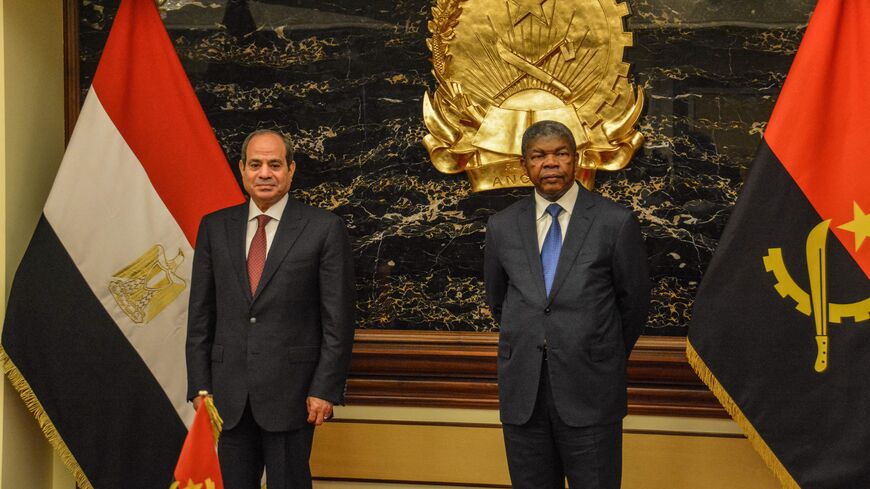Egyptian President Abdel Fattah al-Sisi concluded a first visit to Angola, Zambia and Mozambique this week, demonstrating the continued importance Egypt places on political, economic and security ties with southern Africa and the continent as a whole.
Sisi arrived in Angola on Wednesday, where he met his counterpart Joao Lourenco to discuss strengthening bilateral relations, as well as the conflict in Sudan and the Grand Ethiopian Renaissance Dam (GERD), according to the state-owned Al-Ahram news outlet.
On Thursday, he met Zambian President Hakainde Hichilema and participated in the Common Market for Eastern and Southern Africa (COMESA) summit in the Zambian capital of Lusaka. Sisi urged more regional integration at the summit.
The Egyptian leader then headed to Mozambique, where he was received by President Filipe Nyusi on Friday. The two discussed ways to increase the number of Egyptian companies in Mozambique, security cooperation and Sudan.
It was the first time an Egyptian president visited those countries, Al-Ahram reported.
Egypt's economic problems, including inflation and increasing reliance on debt, are one driver for the visit.
Mirette Mabrouk, director of the Middle East Institute's Egypt program, said that the Egyptian government wants to be viewed as a strategic partner by other African countries.
"It’s all about generating new ties, especially in light of the current economic circumstances," Mabrouk told Al-Monitor.
The expert identified integration, trade and Egypt’s desire to be seen as an “international gateway to Africa” as goals of the trip.
"Egypt needs to be working extremely hard to diversify [its economy]," she said.
Egypt has had some success in increasing economic ties to sub-Saharan African countries. Trade between Egypt and other countries in COMESA increased by more than 20% to $5.3 billion in 2022, Egyptian media reported on Thursday, citing government statistics.
Security cooperation is also a priority for Sisi on his Africa tour, especially in Mozambique. The country has been dealing with an Islamist insurgency since 2017, a threat that Egypt has dealt with for decades, especially in the Sinai Peninsula.
H.A. Hellyer, a scholar at the Carnegie Endowment for International Peace and senior fellow at the Royal United Services Institute, said the GERD is one of several issues alongside food security and refugees that make southern Africa critical to Egypt. Just in the last month, more than 100,000 Sudanese refugees have fled to Egypt since the fighting began in Sudan.
Diplomatically, the continent could offer Egypt support in international organizations.
"When Cairo engages in international fora, it relies on other African states for support," Hellyer, who is also a fellow at Cambridge University, told Al-Monitor.
“They’re not the same kind of relationships as Cairo might have with DC or Western capitals for military or financial investment, but that does not mean they’re not also incredibly important," he added.
The GERD dispute is one of these issues where Egypt is looking for support. Cairo is concerned that Ethiopia's unilateral filling of the dam could dangerously lower water levels in parts of the Nile River in Egypt. Sudan has voiced similar concerns and aligned itself with Egypt in recent years, though the ongoing conflict in Khartoum weakens its position. Negotiations on the issue have stalled, despite mediation efforts by the United States and African Union.
"The dam project that so impacts Egypt comes through African states; refugees from sub-Saharan Africa come through Egypt; food security — such relationships are not optional," Hellyer said.
The GERD issue has been discussed by the United Nations, African Union, Arab League and other international bodies. Building support on the issue could help Egypt pressure Ethiopia toward a future deal.
Another challenge for Egypt that relates to sub-Saharan Africa is climate change. Like other countries on the continent, Egypt suffers from water scarcity. Egypt has 560 billion cubic meters of available water per person each year. This is less than a third of the amount available 50 years ago and below 1,000 billion cubic meters standard set by the UN, Reuters reported in October of last year.
Exchanges between Egypt and other African countries could help Cairo navigate the water climate crisis.
"Egypt needs to be able to mitigate and adapt to climate change, and that requires working with other countries," said Mabrouk, pointing to potential expertise exchanges on water management as one example.
Egypt announced in October plans to launch a satellite to monitor the effects of climate change on Africa.








